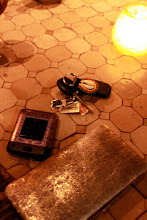Lesson 1:
Sometimes patients flirt with you. This can lead to very conflicting emotions. On the one hand, these patients are often people with debilitating, chronic illnesses, and you can see that this is an exciting interaction for them--and they don't get very many of those. On the other hand, you kind of want to clock them super hard for hitting on you in your workplace.
Lesson 2:
Apparently, as women progress into the later stages of pregnancy, their bellies get so heavy that if they sleep on their right side, their inferior vena cava (IVC) is compressed by the uterus, and they can't breathe well at night as a result. So a lot of women who are pregnant end up preferring to sleep on their left sides or backs instead. I found this news a little upsetting, since I LOVE to sleep on my right side. Does this mean that if/when I am pregnant I'll have to switch sleeping sides? And if I do switch sleeping sides, will I find myself continuing to sleep on my left side after delivering, or will I switch back to my old habit? There's so much uncertainty in my future!!
Lesson 3:
It's amazing how quickly two days off from work can make a person feel lazy to the bone and utterly useless. It's also amazing how one 12-hour shift in a county hospital's ER can make a person feel like they've worked for days on end, even when they've just come off of 3 days of vacation.
Lesson 4:
Turns out I'm pretty interested in women's health issues. I saw a lot of interesting OB/gyn cases while working in the ER, and I found myself really wanting to follow up with those patients and find out what happened to them. Kinda cool.
Lesson 5:
Altered mental status sure can sneak up on you. I had a patient who just seemed to be in a lot of pain and probably had strep throat with complications. A couple hours later this patient started acting strange and forgetting simple things. BAM, the patient is transferred to an isolation room and I'm sitting around worrying that I have meningitis droplets all over myself and my white coat. Thankfully, the patient probably didn't have bacterial meningitis. Something weird was definitely going on though, and I totally didn't realize it at first.
Lesson 6:
A lot of people show up in ERs for completely non-emergent reasons. Some people just call ambulances when they feel lonely or are suffering from slightly-more-than-normal pain from their arthritis. While it can sometimes be gratifying to help these patients by giving them some human interaction (which I'm pretty sure is all they're really looking for), it can also be frustrating to see them taking up beds in the ER when patients with actual medically urgent ailments are still in the waiting room.
Lesson 7:
I put in an IV while I was in the ER! I know this isn't a lesson, but I was kind of proud of the accomplishment, so I decided to count it as one. Here's the lesson: with a good teacher (a really nice nurse showed me how), even a daunting task can be accomplished successfully. Of course, it didn't hurt that my patient had really nice veins, too.
Lesson 8:
If a patient complains of generalized throat pain that gets much worse when you push posteriorly on their hyoid bone, they might have epiglottitis, which is a pretty scary thing to have, indeed. Most young people can't get it, since it's caused by a bacterium that people have been immunized against for decades now, but patients 50+ are still at risk.
Lesson 9:
Learning the dosage of narcotic pain medications is worth one's while. I'm sure most people have it completely memorized by the time they finish med school, or at least intern year, but here it is:
for morphine, give 0.1 mg/kg
1 of Dilaudid is worth 8 of morphine
for Fentanyl, give 1 microgram/kg.
Keep in mind that Fentanyl is really short-acting, despite being very strong.
These lessons may have been a little boring...

Oh, the chemist in me read that as "one mig per kig" and not "one milligram per kilogram". How do doctors pronounce that...
ReplyDeleteHaha, we, too, say one mig per kig. Abbreviations reign supreme.
Delete